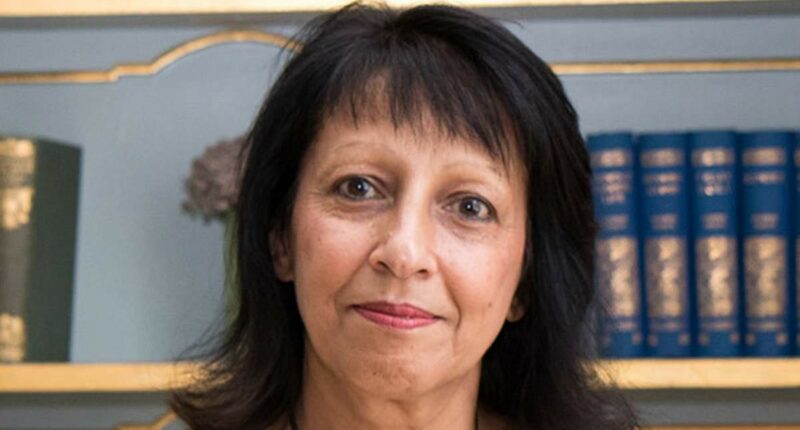Share this @internewscast.com
The head of Britain’s human rights watchdog, Baroness Falkner, led peers in a heartfelt plea against the assisted dying Bill yesterday. She shared her personal battle with ovarian cancer, describing moments of facing her own mortality.
Baroness Falkner, who chairs the Equality and Human Rights Commission, called on the House of Lords to reject what she views as a ‘flawed’ assisted dying Bill, even though she once supported the idea in principle.
This appeal came during a historic debate in the Lords, with 190 peers, including former ministers, bishops, and a former Supreme Court president, expected to participate over two days.
Some 91 Lords spoke in the debate – which lasted six and a half hours without pause yesterday – with two thirds of those opposing the Bill.
Baroness Falkner shared her personal statement with peers, expressing her struggle with an ‘inept and neglectful NHS’ following her diagnosis of advanced stage three ovarian cancer last summer.
She explained: ‘After undergoing two rounds of chemotherapy, three surgeries, and enduring challenging medication until 2027, I have felt a sense of confronting death, as if seeing the Grim Reaper from my hospital bed in a morphine-induced daze.’
She appealed to peers to dismiss Labour MP Kim Leadbeater’s Terminally Ill Adults (End of Life) Bill, stating: ‘There is much that needs thorough examination with this flawed Bill – even from someone like me who once backed assisted dying.’
Former prime minister Theresa May also opposed the ‘licence to kill’ Bill yesterday as it came before the Lords for its first debate after MPs backed legalisation by a majority of just 23 in June.

Baroness Falkner (pictured), chairman of the Equality and Human Rights Commission, urged the House of Lords to reject the ‘flawed’ assisted dying Bill – despite previously supporting the principle

However, Lord Falconer (pictured) urged peers to back the ‘most safeguarded assisted dying measure in the world’ and to respect the decision of MPs and not overturn it
She said legalising assisted dying would reinforce the ‘dangerous notion that some lives are less worth living than others’ and could even be used to cover up mistakes made by hospitals.
Baroness May said: ‘Suicide is wrong, but this Bill, effectively, says suicide is okay. What message does that give to our society?’ However, others spoke passionately in favour of legalising assisted dying.
Lord Falconer, the former Labour justice secretary who is taking the Bill through the Lords, urged peers to back the ‘most safeguarded assisted dying measure in the world’ and to respect the decision of MPs and not overturn it.
He said: ‘There are so many people who’ve been following the debate who recall the agonising death of a loved one, or… who fear what their own death might be like. The elected house has expressed its will.’
The assisted dying Bill will return to the upper house on Friday, when there will be a motion to agree to a second reading. If
it passes this stage, this is followed by committee, report and third reading stages in the Lords, then consideration of amendments by MPs in the final stages and lastly Royal assent.
The Bill must pass all stages by the end of the parliamentary session next spring to become law, or it will fall and not be able to go any further.
Being a private members’ Bill, it will be allocated only limited time for debate and there are fears opponents will lay down dozens of amendments to effectively talk it out.

Former prime minister Baroness May (pictured) said the controversial Bill going through parliament could have a catastrophic impact on disabled people, those with chronic physical illness or mental health problems

Campaigners gather outside Houses of Parliament to demonstrate their opposition to the assisted dying Bill in June
Lord Jackson of Peterborough said: ‘The strength of concern voiced today makes it increasingly unlikely that this Bill will pass at third reading, and momentum is clearly against it.’
In that scenario, supporters of assisted dying would have to start the process again, unless Sir Keir Starmer decided to adopt it as a government bill, which is thought to be unlikely.
The Bill in its current form would allow terminally ill adults in England and Wales with fewer than six months to live to apply for an assisted death, subject to approval by two doctors and an ‘expert panel’.
The first assisted death would take place by 2029 if it clears all remaining stages this year.

















